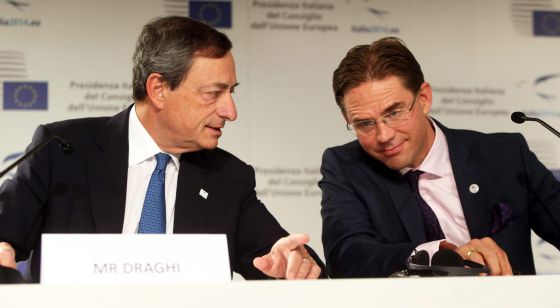
M. Draghi (left.) Along the Economic Affairs Commissioner, J. Katainen. / MATTEO BAZZI (AP)
The battle of the euro is played in France. The rules remain German. But the referee, Mario Draghi, wants to interpret them in Italian and that’s the most refreshing political year just starting new. The Eurogroup ministers meeting euro staged today in Milan the penultimate chapter of the European crisis, which is on track to a third side-effect of self-inflicted recession and austerity tries to overcome this ordeal with a new magic formula: reforms combined with the inevitable monetary stimulus, fiscal and investment.
Paris lobbied ministers for an uncompromising commitment to reforms. And the orthodox Michel Sapin said what everyone wanted to hear: that France will present in the coming weeks their projects, including a sharp cut spending 21,000 million, plus an additional 2,000 million centered welfare system, but also reforms that will be made explicit in the coming weeks. Ministers gave its approval to the plan and in return the European Commission will in November to Paris more time to reduce the public deficit to 3%, explained to this newspaper a minister of the Eurogroup.
That prerogative belongs to the Commission. The current economic Vice President Jyrki Katainen said that to give that margin, France “must show that it has suffered a deterioration of their economic situation and follow the recommendations.” If Paris made public in the coming weeks a commitment to the reforms get that extra time in November, according to sources. “Punish France, under current conditions, is inconceivable. Moreover with the Draghi plan , which requires flexibility, incentives and investment together with reforms to make this work, “said an EU source. That decision, interestingly, will the new commissioner of the Department, the French former minister Pierre Moscovici. The EU has these things.
France goes from bad to worse. Back to skim the recession and will not lower its public deficit to 3% promised until 2017, two years after the agreement. The French economy has stopped, and the measures announced are any less expansive Paris thing: “The last thing we need now is a fine for breaching the deficit or a contractionary fiscal policy; Paris faces a complicated horizon, which should please their partners, but runs the risk of falling into a political crisis after the outcome of Marine Le Pen in the European elections, “said one of the ministers of the euro. The Elysee stirred the stalk of the extreme right looking for another chance
.
Guindos risk alert “a third recession “in the eurozone
Y is unlikely to get it, judging by the tone of the debate in Milan. The Eurogroup has assumed that the ills of Europe require further treatment. The Union has to fight the North-South divide, which has left a huge level of distrust between them. The North has not budged since 2010, but the tide of the crisis has now reached France and Italy, second and third economies of the euro. Big words: Eurogroup chairman, Jeroen Dijsselbloem said that Paris and Rome “have shown great ambition on reforms,” and there is no time for misgivings and to discuss the sequence of the policy mix to come. Must be flexible and then reforms or stick first and then carrot? “You have to do everything at once” settled Dijsselbloem
.
Draghi reiterated that a new recipe that combines essential stimuli and reforms
The Spanish Luis de Guindos said that otherwise “the risk is a third recession.” But the key figure of autumn, perhaps throughout the crisis, Mario Draghi. And in his speech to the ministers was now “less Keynesian than in previous interventions,” according to one attendee at the meeting. But in public he could not be clearer: “The modest recovery is fragile and uneven. The ECB is ready to do more if necessary. But monetary and fiscal stimulus will not work in the absence of reforms. ” Reform, reform, reform: that was the word of the day, and is certainly the rhythmic tapping of the crisis. France will not slip away this time without action on that flank. But instead will margin, like Italy. The crisis has come to the great, and it could not be ignored by Draghi.
No comments:
Post a Comment